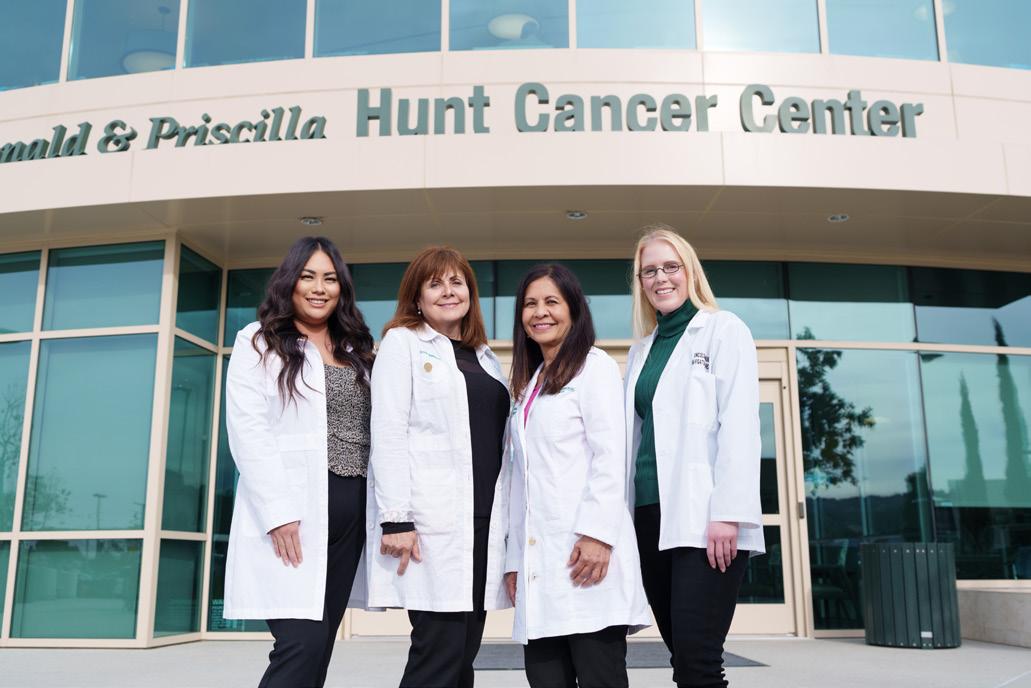
5 minute read
Meet the Torrance Memorial Oncology Nurse Navigators
from Pulse
Providing cancer patients with a compassionate, knowledgeable advocate
Written by Melissa Bean Sterzick | Photographed by Vincent Rios
A cancer diagnosis can be devastating, and the steps from diagnosis to treatment and recovery can be overwhelming for patients. The oncology nurse navigators at Torrance Memorial's Hunt Cancer Institute, an affiliate of Cedars-Sinai Cancer, have comprehensive oncology expertise and knowledge to support cancer patients and their families through the journey. Every nurse navigator is nationally certificated in the oncology nursing practice through the Oncology Nursing Certification Corporation.
The goal of the nurse navigator is to promote positive patient outcomes by providing one-onone support to patients with individualized care
throughout the cancer continuum. Nurse navigators perform nursing assessments, triage patient care needs, coordinate care (including necessary tests and procedures), schedule physician appointments, and help provide access to patient education and community resources and support. The nurse navigator works collaboratively with the cancer care team of experts to help eliminate barriers to timely access to care, such as financial, psychosocial, social, logistics, insurance, language, transportation, lodging and support systems.
Most patients with a new cancer diagnosis are overwhelmed by their change in health and the many steps needed to plan and organize their
treatment. Patients often don’t know where to begin to get support and guidance. Each patient deserves the highest level of cancer care where their medical, social and emotional needs are met. As a nurse navigator, Anne Milliken, BSN, RN, OCN, says, “I strive to listen to my patients’ wishes and compassionately help guide them with cancer knowledge, information and resources. I am there to help patients over the barriers and through their journey.”
Rudy Rueda, who was diagnosed with colon cancer in late 2022, says, “If I have any questions, Anne calls me right away. I’m not sure if she eats or sleeps or does anything else—it feels like I’m her only patient. It’s so comforting because there are times you need information right away. Without the support of a nurse navigator, you’d have to become an overnight expert on the condition—and depending on the severity of your condition, that could be impossible.”
Rudy’s mother passed away from the same illness 20 years ago. “There was no Anne Milliken in my mom’s day. She had to be her own coordinator on top of going through the cancer,” Rudy says. “I can only imagine whoever came up with this program must have had family experience with cancer.”
The nurse navigators serve as a communication link, helping ensure timely diagnostic workups and coordination of results. They help ensure needed patient information is available to the many oncology care team experts reviewing each patient’s medical record and collaboratively develop individualized treatment care plans. Nurse navigators also link cancer patients to needed specialty programs offered within the Hunt Cancer Institute and beyond to ensure all their needs are met.
“Having access to timely information, and support is invaluable to patients,” says nurse navigator Evelyn V. Calip, BSN, RN, CNCN, who is a breast cancer survivor. “Every patient I see is benefiting in three crucial areas: education, coordination of patient appointments and assessing barriers to care with a high-touch approach.”
Nurse navigators also provide individualized care to address each patient’s clinical and emotional needs during their cancer journey so they feel
better prepared and supported. Nurse navigator Lauren Landefeld, BSN, RN, OCN, says, “I let patients know what to expect before, during and after surgery, and what to expect from the hospital experience. I want to empower my patients and help them push through their anxieties about surgery and treatments for best patient outcomes.”
Nurse navigators follow patients on an outpatient basis from their diagnosis, coordinating the many steps to cancer treatments and recovery. Imee Uy, BSN, RN, who served on the dedicated oncology unit for the past five years, recently transferred to the role of oncology nurse navigator. “I’m excited to bridge my inpatient oncology experience with the outpatient setting so I can advocate and support my patients from diagnosis through all phases of treatment,” she says.
Nurse navigators are valued and trusted advisors for newly diagnosed cancer patients. Coordinated cancer care enhances the timely care and outcomes for patients, their families and all cancer care team members involved.
“I am a cancer survivor myself and had no one to guide me as a young mom struggling to navigate the landscape of treatment options available for my diagnosis,” says Anne. “With no family living close by to guide me, I remember feeling helpless and lost.”
John Morse and his wife, Beverly, call Anne an angel. After his diagnosis, John struggled to manage all the paperwork and scheduling. Once his gastroenterologist connected him to a nurse navigator, the important aspects of his treatment were set up quickly.
“She’s been wonderful and so helpful dealing with all the referrals and insurance. She has been a godsend,” says Beverly.
Nancy Lean, MSN, MHSA, NEA-BC, director of oncology services at Torrance Memorial, says, “Personalized compassionate care is at the heart of nurse navigation, and we are fortunate to have such a dedicated and caring team of clinical expert nurse navigators supporting our patients here at Torrance Memorial Hunt Cancer Institute, an affiliate of Cedars-Sinai Cancer.” •
To contact a Torrance Memorial oncology nurse navigator, email canceranswers@tmmc.com or contact the Hunt Cancer Institute at 310-517-7077.

